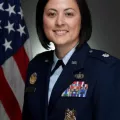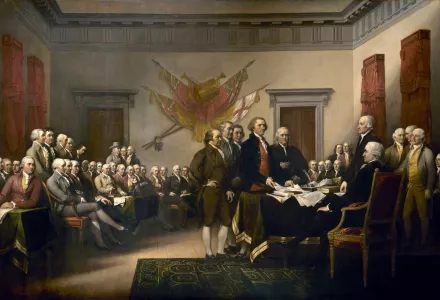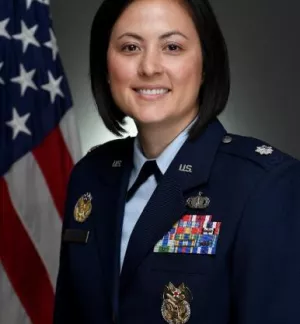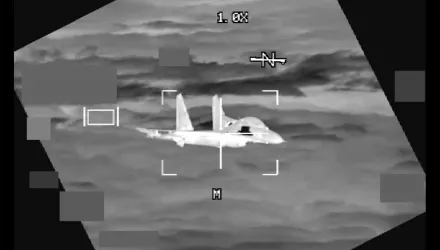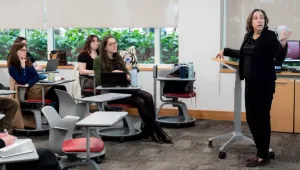Preserving a nonpartisan military is sacred and critically important to the institution and the military’s role in defending our nation. Today’s society is characterized by intense partisanship as seen in current events, media, and technological changes, with recent polls indicating the public’s trust in the military waning. As a microcosm of society, military members are increasingly at risk of being influenced by this political partisanship. A nonpartisan military is not only essential to maintain the trust of our elected civilian leaders, but also of the public and the men and women of the Armed Forces. To preserve this trust, the Department of Defense needs to reenergize core democratic principles for military members by implementing professional military education on the foundational tenets of why the military is nonpartisan, balancing political astuteness and being political, and the effects of political influence by media, technology, and former military leaders.
“We [the Armed Forces] have a great asset and that is that our people, our countrymen, do not distrust us and do not fear us […] our fellow citizens, are not afraid of us. They don’t harbor any ideas that we intend to alter the government of the country or the nature of this government in any way. This is a sacred trust…we are completely devoted […] the sole purpose of which is to defend the republic. We concentrate our time and attention on that subject […] we devote our time and attention exclusively to this. And I don’t want you to do anything…to damage this high regard in which the professional soldiers in the Army are held by our people, and it could happen […] if you don’t understand what you are about, and how important it is that this reputation we have is of enormous importance, not only to the Army but to the country. This is my principal charge to you, this is the thing I never want you to forget in the dust of battle and when the pressures will be on you…”[1] – George C. Marshall
General George C. Marshall gave these words shortly before his death in 1959. They are words that every U.S. military member should heed as they swear (or affirm) their duties to “support and defend the Constitution of the United States against all enemies, foreign and domestic…”. This oath is the very foundation of every military member’s service to our country and an obligation in which we must preserve.
Elected civilian leaders must have the faith and confidence that military leaders are advising solely from a nonpartisan view and are not trying to push a political agenda. The public must also have the trust and confidence in a nonpartisan military to protect and defend the Constitution and the nation against all enemies foreign and domestic. Additionally, it is critical to preserve the trust of the men and women that we serve along with every day. Taking a political stance undermines the trust of people serving with you and that you lead, the trust of elected civilian leaders, and the public. Recent Gallup polls showed that, in 2021, the military stood as the most trusted U.S. government institution at 69%, down from 72% the previous year. This drop is in line with another poll, conducted by the Ronald Reagan Presidential Foundation and Institute that found public support for the military fell by 14 percentage points from 2018 to 2021. In 2022, the Edelman Trust Barometer, an annual trust and credibility survey, found there was a growing lack of faith in media and government. As the public’s trust in the government and the military is challenged, the military needs to heed General Marshall’s advice.
When our Founding Fathers established the ability to raise troops for the common defense of the United States, they had concerns with establishing and maintaining a standing Army. Influenced by the abuses witnessed in Europe, they wanted to ensure a standing Army did not become overpowering or pose a danger to our government and people, when they established our nation’s construct, governance, and the Constitution. It is a basic tenet of democratic theory that the Armed Forces remain a nonpartisan institution operating at the behest of our elected civilian leadership, maintain an advisory role versus imposing judgments, and that elected civilian leaders governing our country oversee all aspects of military operations. To be nonpartisan, or not be biased toward any particular political group, is critical in the military’s ability to fulfill their role. America depends on this civilian-military relationship as a core tenet of our democracy, ensuring the military is always in a position to support and defend the Constitution.
Civilian-military relations have become a more prominent topic in the media and the public eye, with increased debate on whether the military has waned from their nonpartisan roots. Some of these articles cite that senior military leaders’ influence has grown, undermining the trust and confidence of elected civilian leaders, while others argue that the strength of the military’s professionalism limits partisan politicization. There is a tension between being who we are as citizens and who we are as military members. Opinions range from believing we should be able to do both, being who we are as citizens and at the same time turning off our personal biases or beliefs when we put on the uniform, while others believe we always represent the military whether we are in uniform or not.
Regardless of these debates, it is clear that our nation’s partisan divides along with recent events such as former senior military leaders voicing their political views supporting or opposing previous administrations and making their stances known publicly have the ability to influence military members. Over the last decade, the military has been pulled into partisan politics, increasing political polarization of the nation and negatively influencing military members’ ability to remain nonpartisan. Former military members, especially General Officers, should be more constrained in taking public political stances after service, as this inevitably influences active military members and the public’s view of the military institution although these members are no longer actively serving. As General Martin Dempsey stated in response to former senior military members taking public stances, “the American people should not wonder where their military leaders draw the line between military advice and political preference […] And our nation's Soldiers, Sailors, Airmen, and Marines should not wonder about the political leanings and motivations of their leaders.”
The Department of Defense cannot necessarily control former senior leaders in making these public statements once or as they occur, but they are able to instill in current military members the negative effects this has on the institution to prevent it from occurring more in the future and diminish the effects it has on the military institution. In today’s time with the internet, social media, and globalization, current or former military members’ actions or words can impact the reputation of the institution as a whole and sway the public’s opinion.
A key contributor to this negative influence is media and the internet, especially social media. Social media matters; it influences how people think and what they know. This applies to military members too. Social media and applications are turning mobile information and communications technology into political tools that enable users to express political views, spread disinformation, and influence views. As a result, social media applications are rapidly spreading and increasingly being used for political manipulation. Of note, coordinated inauthentic behavior has become prevalent on social media sites which influences opinions on political topics by relaying a false sense of support and legitimacy. Additionally, disinformation campaigns degrade democratic social institutions and distort the views of social media users. The internet is a conduit to continue the spread of disinformation.
A recent study found the average American spends almost seven hours per week on social media platforms and checks their phones up to 63 times a day. As social media continues to become more prevalent, society, to include military members, need to become more educated on the internet, social media platforms, and applications to ensure they are absorbing information, and are not being influenced by political actors whose intent is to present less than accurate information or politically sway consumers of information. Technological innovation in social media platforms have changed how individuals and states interact and enables media manipulators and disinformation actors to influence society through large scale communication to transcend the boundaries of their normal sphere of influence. Increasing our knowledge and understanding of these matters is not only critical to preserving a nonpartisan military, but also in understanding the crisis of legitimacy of information and the sociological impacts of the internet and social media.
The political polarization our nation has been experiencing has been exacerbated by the effects of traditional and social media. These partisan divides were on full display during the last presidential election which resulted in the January 6, 2021, attack on our Capitol. The fact there were military and former military members present during the attack led to Secretary of Defense, Lloyd Austin ordering a DOD-wide stand down to discuss the problem of extremism in the ranks. The intent of the stand down was to reinforce military values and the importance of the oath, and to listen to military members’ views on extremism. The feedback from the stand down ranged the full gamut of just being another check-the-box requirement to being some of the best in-person training experienced. The vast difference in experience was based on how each unit commander decided to run the stand down even though the Defense Department provided guidelines and talking points on how to hold the training.
Military values and the oath that every member takes need to be reinforced throughout military members’ careers, however, it should be done in a more systematic way through professional military education or more formalized training to ensure a more consistent message that is not influenced by personal political or biased views. It should also be accompanied by more extensive training on the foundational tenets of why the military was created to be a nonpartisan organization, how to balance being politically astute and how that differs from being political, and the study of the internet and social media. Educating the force on these topics addresses more of the root cause of how people are influenced towards extremism or extremist views and how members’ own biases are formed.
As the Department of Defense has implemented education and training on these topics, they are not sufficient to overcome the increased challenges posed to preserving a nonpartisan military. The following recommendations are offered for implementation in the Department of Defense:
- Implement education throughout the multiple levels of professional military education for all military members on the foundational tenets of why the military is nonpartisan and what that truly means in a service members’ life. These core tenets should be incorporated into doctrine for the Armed Forces.
- Develop and implement courses throughout professional military education on the importance of being politically astute, understanding politics, policy, why and how policymakers develop policy, what military advice means and how it should be provided to elected civilian leaders, and how this differs from being political. Discerning between policy and providing military advice is especially important for senior military officers as they promote into positions where they will be expected to provide military advice to elected civilian leaders.
- Develop and implement courses throughout professional military education on the study of the internet and social media, media manipulation and disinformation, and how it influences political perceptions and our society. Military members (and society as a whole) need to have a better grasp on understanding how the internet and social media platforms operate, their infrastructure, how data is used, and the effects they have on our society, culture, and the way we communicate to decipher what information is legitimate and factual to be better informed and minimize the negative influence and implications these systems have on military members’ own views.
- Routine conversations and education need to be incorporated at the unit level to address the impact of political polarization our country is enduring and how military members can better buffer themselves from the noise. For instance, at times in the military, influential senior military leaders have a loyal following of military members based on the high-level of respect they have for the senior leader. As these senior military leaders retire and leave service, active-duty military members need to recognize that if these leaders make their political stances and actions known publicly, military members cannot allow them to influence their own views or biases and the negative effects these actions have on the military institution. As previous military leaders continue to be more vocal in the media and in the public political realm, active-duty members need to recognize those leaders no longer represent the military and not allow themselves to be drawn into the political issues and debate these leaders are engaging in.
A nonpartisan military is crucial to securing the trust of our elected civilian leaders, the public, the men and women we serve with, and our ability to protect and defend our national interests, and our democracy. Years of partisan divides, events, and technological changes have brought us to this point. It will take time to shift the military culture and the influence these factors have had on our military. The Department of Defense needs to start now in correcting the path forward by incorporating the education needed to restore democratic ideals and preserve a nonpartisan mindset for military members.
Victoria Mayo is an active-duty Air Force Lieutenant Colonel and currently serving as a National Security Fellow at the Harvard Kennedy School Belfer Center for Science and International Affairs.
The views expressed in this article are those of the author and do not necessarily reflect the official policy or position of the Department of the Air Force, Department of Defense, or the U.S. Government.
[1] Forrest C. Pogue, George C. Marshall. 3: Organizer of Victory, 1943 - 1945, 2. print (New York: Viking Press, 1973), 458-459.

